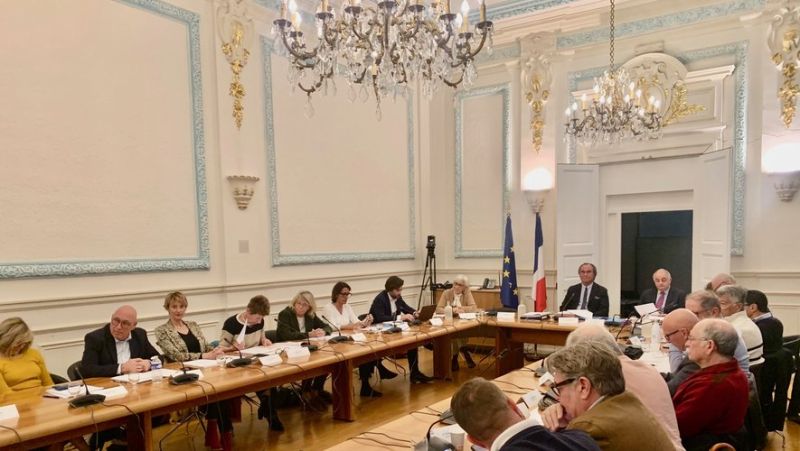“When we prefer the urban to the human”: the Sète municipal council struggles with the future city contract

Les élus du conseil ont longuement débattu sur l’accroissement de la pauvreté à Sète. – V. G.
Municipal elected officials were angry, Monday evening in council, over the future 2024-2030 city contract, which sets the major local social guidelines in the medium term.
"The opportunity to see the other side of the postcard." Monday evening, the municipal opposition took advantage of the debate on the future 2024-2030 city contract to attack the majority on its social policy. This “contract”, which allows the realization of urban projects between the State, the City and its partners, contributes to improving the daily life of residents in neighborhoods experiencing difficulties, in the areas of ;rsquo;education, employment, housing and living environment, delinquency, access to rights, health… As such, the total amount of subsidies paid amounts to 21 M€ between 2015 and 2022.
"We are far from self-satisfaction projects that border on indecency"
To prepare this 2024-2030 contract, 122 people took part in discussions, and 93 structures (associations and representatives of public institutions combined) were represented. To the themes and priorities given by the State (education and youth, employment, public peace and access to rights), are added those defined on the city , in particular by taking into account the needs expressed by residents (emancipation through education, through culture, through sport, through health and the coordination of local urban and social management).
Subjects dear to the left-wing opposition, which was quick to “type” on the balance sheet of the municipality in place. "It’is the right time to take a picture of the situation, begins Philippe Carabasse, member of& ;rsquo;a left-wing opposition which had access to the observations of the previous city contract. We are far from self-satisfaction projects that border on indecency. The system reveals increasingly tight land tenure. There are four consequences: difficulties in economic development, with more and more service jobs and precarious contracts; difficulties which are worsening for low-income households; demographic difficulties; and residents’ journeys which are becoming more and more constrained. We have been seeing these populations in HLMs for 18 years."
2,890 people in poverty
The elected official on the left notes again: "The results also show the significant vulnerability of people who live in QPVs. The city contract gives a figure: 2,890, the number of people in poverty or near-poverty. I really want bridges for 600,000 € and shower baths, but these people will never see them. It is there, the reality that we seek to hide. The CCAS, thirty times a month, sends people to Secours populaire, because it cannot receive them!" Philippe Carabasse finally points out that in fragile neighborhoods, a large number of young people (55% on the island of Thau) concentrates indicators of fragility. "Since 2012, the situation of these young people has not changed. It’s appalling. Mr. Mayor, you have been here for 23 years, you are responsible. When we prefer the urban to the human, we arrive at these situations. You sacrifice entire neighborhoods."
"Yes, people are precarious, that's why we exist and why we work"
These comments particularly disturbed Jocelyne Gizardin, the assistant for social action and vice-president of the CCAS. Speaking of "blackboard"portrayed by the elected Green, she recalled that "all the cities of France" had the same difficulties. "We benefit from the contract because we own these neighborhoods. The goal is to have a city of social diversity. The work is done, we have networked everything that could be done. We come across associations and people who do difficult work. We rely on the living forces. Yes, people are precarious, that’s why we exist and why we work."
Loan guarantee for the benefit of the SPLBT: the opposition refuses to vote
Despite a long argument from François Escarguel, the deputy delegate for finance, aimed at reassuring the opposition on the links that the City maintains with the local public company of the Bassin de Thau, elected officials from the left and the extreme right refused to vote on deliberation no. 32. This validates the 50% guarantee by the City of a loan of 7 M€ over fifteen years of the SPLBT, contracted with the aim of "ensuring the cash flow necessary for investments linked to the Public Service Delegation of Parking". "For what and where will these 7 M&euro go? ? We don't have enough evidence to discharge you. There is a great lack of clarity, it’s total vagueness", insisted the opposition.
"The Secours populaire fulfills a role ? So give it more than 3,000 € grant per year!, Véronique Calueba jumped back. We have no guarantees, in this contract, that the funding will be allocated." The departmental councilor is campaigning for "the rehabilitation of the citizen council, co-decision and popular participation" in ultra-local decisions. "You present your electoral program to us ?", questioned Hervé Mertz, the elected citizen for citizenship . A long debate for a deliberation finally voted on… Unanimously.




